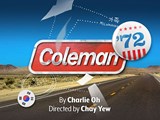By Brian Robin
Charlie Oh’s Journey to "Coleman ‘72"
Charlie Oh’s path to playwriting involved what he thought was his dream job. It involved hotel rooms all over North America, Lauren Yee and SCR’s world premiere production of Cambodian Rock Band and the Segerstrom Center for the Performing Arts (SCFTA).
And it involved him getting over his fears of living off the written word—his written word.
Oh was two years out of Northwestern, theatre degree in hand, when he was cast in the national tour of The King and I. He joined the in-process tour in Costa Mesa—at SCFTA. While that was happening, Yee’s Cambodian Rock Band was playing at SCR.
“We connected when I was a senior at Northwestern,” Oh said about Yee. “She was my senior playwriting thesis mentor. She was a mentor figure to me, so when I had a day off, I came over and watched Cambodian Rock Band. It was a cool moment.”
That “cool moment” was one of several during the spring and summer of 2018 that would lead Oh away from the stage and to his laptop. Five years later, it would bring Oh back to SCR in a different role than theatregoer—featured playwright of a world premiere production—his Coleman ’72. It runs April 23-May 14 on the Julianne Argyros Stage.
The outgoing Chicago native, who grew up in the city’s sprawling western suburbs, is enjoying what he now knows is his dream job. No longer is he afraid of writing, or viewing it as a sidelight to acting. Yes, he wrote sketch comedy and parts of a musical at Northwestern. …
“But I never thought of myself as a writer. It just kind of happened,” he said. “I was focused on acting. I think writing is scary. Writing leaves you very vulnerable and it’s really hard. I didn’t have the confidence to consider myself a writer. I thought that writers were people who wore cool berets and smoked cigarettes while living in France. I didn’t think I was someone who was that.”
Getting cast in The King and I changed that, only Oh didn’t realize it until he was immersed in the production. Seeing Cambodian Rock Band spurred something inside of him that traipsing all over the continent helped bring out.
“This was the biggest job as an actor I’ve ever gotten. Acting in this incredible production that was directed by Bartlett Sher with these amazing actors,” he said. “I thought this was what I wanted my entire life. Then, I started to do the tour and while I really enjoyed working in that show and realizing how great an experience it was, there’s something very unique in getting what you think is your dream job and realizing there’s something still artistically restless in me. There was more that I wanted to do and more that I wanted to say.
“While we were on this tour, jumping around to all these cities in America and Toronto, I started to come back to my hotel room after performances and write plays, which I hadn’t done since college. This was a dream job in so many ways, but there was still something artistically unfulfilled in me. By writing in these hotel rooms across America, I had this realization that I was starting to have as much, if not more, fun writing my own plays than (acting) in the show itself. That was really kind of an epiphany moment when that happened. I consider that one of the pivotal moments in my life, when I realized as much as I loved acting, I actually loved writing so much more.”
Oh returned to New York after the tour and enrolled at The Juilliard School’s renowned Lila Acheson Wallace American Playwrights Program. It didn’t take long for this decision to bear fruit. Oh’s play LONG, about two Asian American men working in the gay porn industry, won the Kennedy Center’s Paula Vogel Award in Playwriting and took second in the Mark Twain Prize for Comedic Playwriting.
That success segued into Coleman ’72, a literal child of the pandemic. Oh was living in New York and he was scheduled to take part in a writer’s group where 12 writers would each write a play over a month. He was on deck for April when the pandemic hit and the world shut down. In mid-March, Oh rented one of the last cars in New York City, threw a bunch of clothes in a suitcase and drove 12 hours straight to his parents’ home outside Chicago.
“I’m here, there’s nothing else to do, so I’m just going to write this play anyway,” he said. “I didn’t know what I was going to write and I was playing with another idea before the pandemic started that was a really dark idea that was with me—an end-of-the-world play. Well, with what was going on, I said I didn’t want to write that anymore.”
Instead of going outward, Oh turned inward. He decided to write a play that was, in his words, “a peek at family history.” He talked to his father, his aunts and uncles, his grandmother and numerous Asian American friends, soaking up numerous stories that he turned into “a play that is personal and inspired by and situated around my family history.”
Oh was so dialed in that he wrote the first draft of Coleman ’72 in three weeks, something he said is “not usual.” Revisions over the last three years, including those during the 2021 virtual PPF and during a 2022 workshop at SCR, followed. But the central theme of a family’s cross-country journey in the summer of 1972 and what they remembered from it remained.
Before it even found a stage, Coleman ’72 won the Kennedy Center’s Paul Stephen Lim Playwriting Award. And its story of nostalgia and how people remember memories from their past resonates on numerous levels.
It certainly resonates with Oh, a self-described “history omnivore” who wrote Coleman ’72 partly as a way to build understanding that too much nostalgia can be a dangerous thing—the exact sentiments he told SCR’s Director of The Lab@SCR Andy Knight, who is the play’s dramaturg.
“I’ve been thinking a lot about the idea of nostalgia and how it’s at the crux of a lot of political, moral and social debates we have, debates that come down to the nostalgic view we have about American history that isn’t there,” he said. “That’s the political part of it, that there’s something comforting about nostalgia. Something safe and easy about plastering over the past. The hard work, the uncomfortable work of facing the past, facing the truth is difficult but necessary. That can lead to a more fulfilling understanding of who we are and where we came from.
“It’s hard and it takes work, but I think that is part of Coleman ’72, to grapple with your past can be difficult. But if you do that and you do it with rigor and grace, that can be ultimately illuminating and rewarding. That’s a large part of what’s going on in Coleman ’72.”


